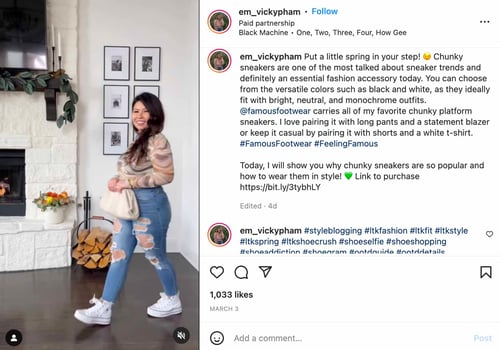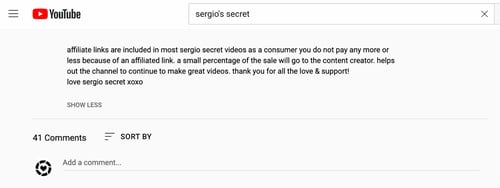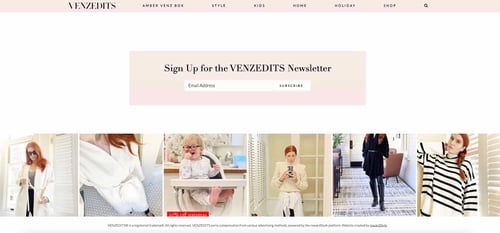As influencer and brand relationships continue to evolve across web and social platforms, it’s important to keep up to date on best practices for following the Federal Trade Commission (FTC) Endorsement Guidelines. The FTC is a US agency that monitors advertising in all media forms, including social media, to ensure that endorsements are honest and not misleading. We’ve put together a rundown of best practices to keep your LTK affiliate content and sponsored content FTC compliant.
What to do as an LTK Creator
DO:
- Use the LTK Creator app, LTK posts created in the app have disclosures built in.
- Clearly disclose when you have a financial or family relationship with a brand, or when you receive a benefit from a brand.
- Use #Ad or #Advertisement. You may also add #Sponsored or #Paid as a best practice.
- Ensure your disclosure is clear and evident, so the consumer will notice it. This means it should appear in the first line of text; for Instagram that means it must be visible without needing to be expanded (“above the fold”).
- On image-only platforms like Instagram Stories, superimpose disclosures over the images.
- Disclose that you could earn a commission on LTK or rS links.
- Make sure that any opinions you express about a product or brand are honest and your own, and a typical consumer experience. (Don’t imply atypical results.)
- Consistency is key, so make sure you always use these practices as you post.
What NOT do as an LTK Creator
DON’T:
- Assume your followers know about all your brand relationships.
- Assume disclosure built into social media platforms are sufficient, such as Instagram’s paid partnership notice.
- Use ambiguous disclosures like #thanks, #spon, #sp, #collab or #ambassador.
- Rely on disclosures that people will only see if they click “more.”
- Do not represent that you are a current or recent user of a product or service if it is not the case
FTC best practices per social channel
- Instagram and Facebook: Using Instagram or Facebook’s tagging tool alone is not sufficient for disclosure per the FTC. Instead, the FTC recommends using #ad or #sponsored in a visible part of the post’s caption, i.e. prior to the “more” cut off.
- Instagram Stories, Reels, and Swipe ups: Add clear text to top of your image to disclose that the post is an endorsement.
- If making an endorsement in a live stream, the disclosure should be repeated periodically so viewers who only see part of the stream will get the disclosure.

- TikTok: You can use #Ad in your caption, as well as a superimposed pop-up on top of your video disclosing the partnership within the first 15 seconds of your video, like you would on an Instagram Story.
- YouTube: In your sponsored videos:
- Verbally disclose sponsored content at the start of videos.
- Use text overlay disclosures at the start of sponsored videos.
- In addition to the first and second bullet point, the FTC also recommends the use of clear disclosure language in the video description above the “Show More” cut-off.
- The disclosure should be repeated periodically so viewers who only see part of the stream will get the disclosure.

- Pinterest: Use #Sponsored, #Promotion, #Ad, or #Commissionlink in your content or tags. Also use a superimposed pop up on top of your video disclosing the partnership within the first 15 seconds of your video. You can also disclose the partnership using content such as, “I get commission for purchases or clicks made through links in this post.”
- Blog: Adding a disclosure to the top of sponsored posts is a best practice. This can be a line of text stating: “This post is sponsored by X.”

How do I ensure my LTK content is compliant with FTC guidelines?
Whenever you post an LTK product link or post link on your social media channel or blog, clearly disclose to your followers that this is an affiliate link or sponsored content. For more information on FTC guidelines, click here.
What could happen if I don’t follow the recommendations?
The FTC initiated and settled its first-ever complaint against two individual influencers in 2021. It has also issued more than 90 educational letters and additional warning letters to various influencers reminding them to clearly and conspicuously disclose relationships when they promote products or services. And brands are increasingly focused on ensuring influencers they work with are compliant, often explicitly requiring it. In fact, many top brands also received a letter from the FTC in late 2021 around the FTC’s plans to monitor and enforce in this area. So compliance is not only a great way to protect yourself, it’s a best practice for your business and your partnerships.
Where can I find out more?
The FTC recently updated a post called What People Are Asking to explain more about endorsement disclosure rules. There are influencer, affiliate and social media-specific sections:
DISCLAIMER: This information is for educational purposes only. This is not, nor is it intended to be, legal advice. If you have questions about your disclosure practices, then you should consult legal counsel.
